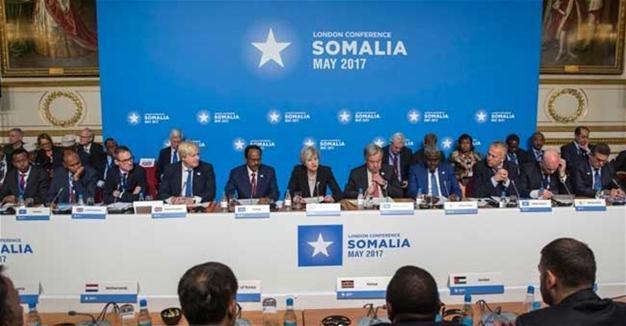Somalia asks world to help stabilize ravaged nation

Somalia’s president on Ma 11 urged world powers to help him fight the “raging enemies” of terror, corruption and poverty, at an international conference aimed at stabilizing the crisis-wracked country under his new leadership.
Mohamed Abdullahi Mohamed told the London gathering that the conflict-ravaged state could thrive on the Somali natural flair for commerce if it can hold off the threats of famine, piracy and Islamic extremism.
The one-day conference, attended by world leaders, is looking to strike a new agreement between Somalia and its international support network to speed up progress on security, development and the economy by 2020.
The troubled east African country, which has frequently topped the Fragile State Index, is under a new president, prime minister and parliament this year and the conference is focused on underpinning stability in this electoral cycle.
“I will spare no effort to realize the promise of my campaign which was to fight Somalia’s three raging enemies: Terrorism, corruption and poverty,” the president, widely known by his nickname Farmajo, told the conference.
“I will take measurable steps to unleash the great potential of my people to develop their own country and to do what they know best: Trade and commerce.”
The conference -- focused on national security, political infrastructure, economic recovery and combating drought -- is being co-chaired by Farmajo, United Nations Secretary-General Antonio Guterres and British Prime Minister Theresa May.
Guterres said the drought was Somalia’s “most pressing priority” and appealed for an additional $900 million by the end of the year to prevent it worsening into a famine.
“Somalia has to rebuild security, foster transparency and accountability, deal with a crippling drought and avert famine,” he said.
“More than six million people in Somalia need assistance, or nearly half of the population.”
The U.N. said last week that Somalia will have 1.4 million acutely malnourished children by the end of the year, up 50 percent from late 2016.
The conference is also looking to ensure Somalia can take greater responsibility for its own security from the 22,000-strong African Union troop deployment.
For the last decade, the militant group al-Shabaab has been fighting to overthrow the Somali government.
According to a U.S. defense official, the Pentagon currently has several hundred troops stationed in Somalia, primarily devoted to counter-terror training.
U.S. forces also assist Somali troops in operations against al-Shabaab, and last week a Navy SEAL was killed during a night-time raid outside Mogadishu.
President Donald Trump has granted the military’s Africa Command greater leeway to conduct strikes against strikes on al-Shebaab.
May said Somalia now had a “critical window of opportunity” under Farmajo to take control of its own security and build its economic capacity.
“If Somalia is a foothold for terrorist groups... if global trade is hijacked by pirates in the Indian Ocean, or if millions are continually displaced in a desperate bid to escape poverty and drought,” its impact is felt worldwide, she warned.
The gathering is also trying to secure a path towards debt relief in one of the world’s poorest countries. Relief of its $5.3 billion long-standing debts will be dependent on Somalia reforming its economy.
The meeting was attended by Turkish Prime Minister Binali Yıldırım, U.S. Defence Secretary James Mattis, EU foreign affairs chief Federica Mogherini, the presidents of Kenya and Uganda, the prime minister of Ethiopia, and the foreign ministers of Egypt, Germany, the Netherlands and Qatar.
Mogherini pledged 200 million euros to bolster Somalia’s development, stability and security.
“We want Somalia to rise again,” she said.
 Somalia’s president on Ma 11 urged world powers to help him fight the “raging enemies” of terror, corruption and poverty, at an international conference aimed at stabilizing the crisis-wracked country under his new leadership.
Somalia’s president on Ma 11 urged world powers to help him fight the “raging enemies” of terror, corruption and poverty, at an international conference aimed at stabilizing the crisis-wracked country under his new leadership.